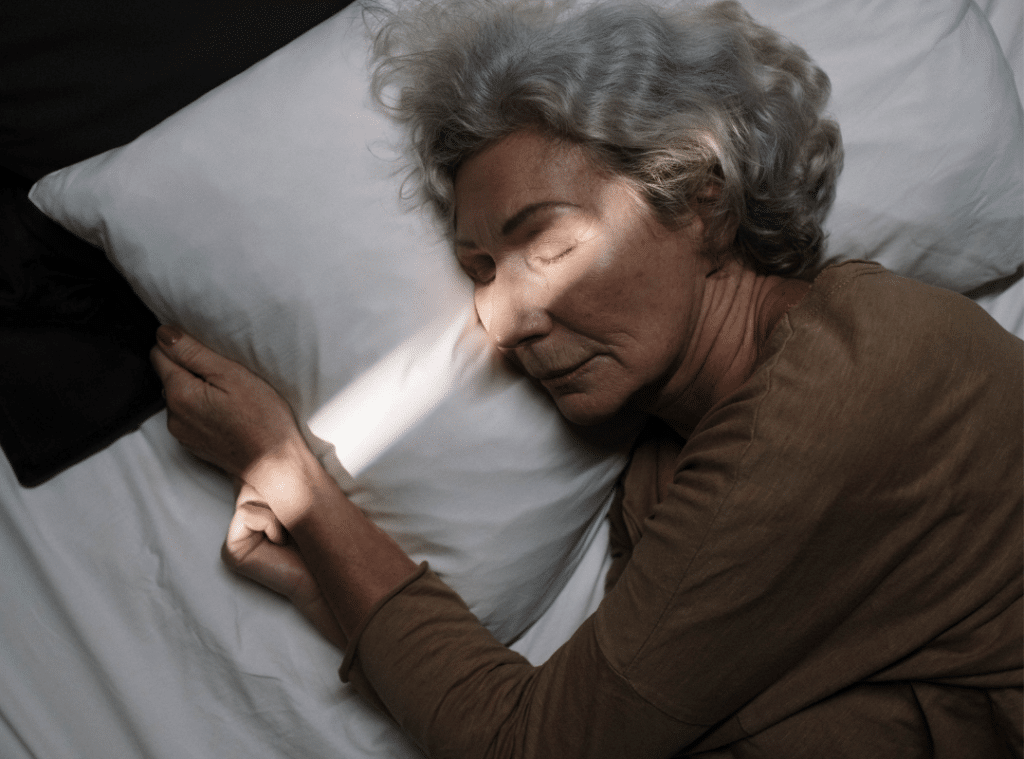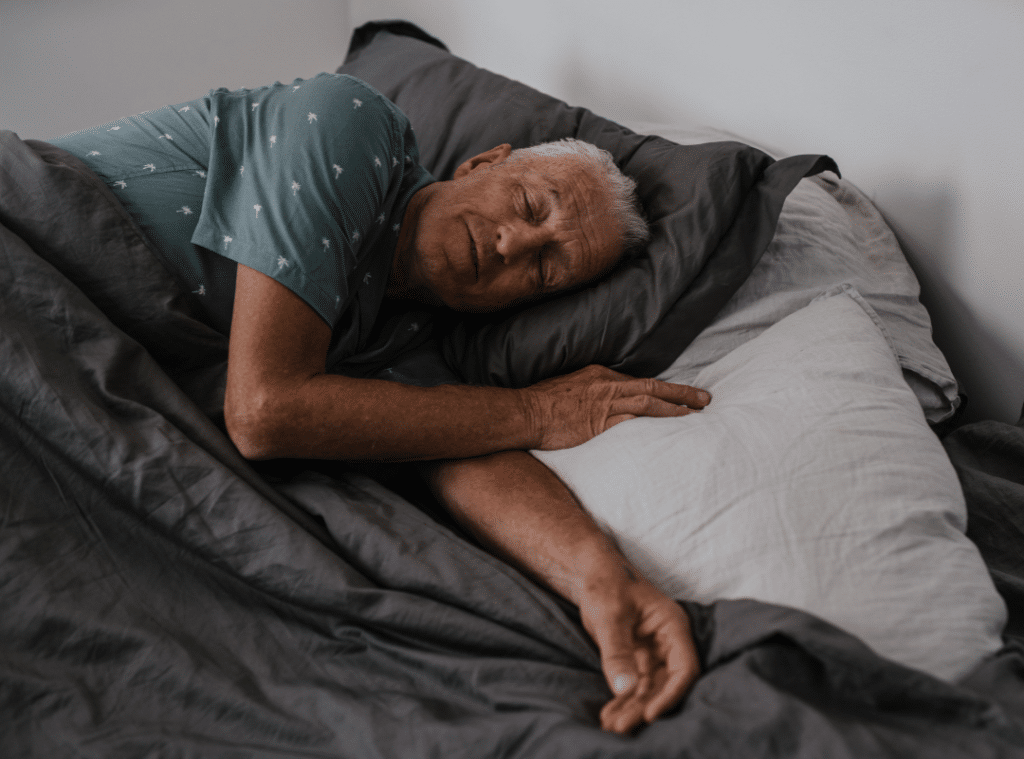Solutions And Tips: Elderly Sleep Problems
It’s interesting how many people overlook sleep issues among the elderly, yet it’s a common struggle. Many factors contribute to these challenges, from lifestyle choices to underlying health conditions.
Understanding these elements is vital for finding practical solutions. At Westmont of La Mesa, we recognize that simple adjustments can significantly improve sleep quality.
What if a few minor changes could transform nightly rest into a more restorative experience? Let’s explore some practical tips and solutions that can make a difference.
Elderly Sleep Problems: Causes, Effects, and Solutions
Sleep problems often become a common concern as you age, stemming from various factors that can disrupt your nightly rest. Understanding your sleep habits is essential for maintaining ideal sleep health. Fragmented sleep and increased awakenings can occur due to medical conditions, medication side effects, or poor lifestyle choices, such as irregular sleep schedules or excessive daytime naps. These disruptions can lead to considerable daytime sleepiness, affecting mood and cognitive function. To address these issues, establish a relaxing bedtime routine, create a comfortable sleep environment, and prioritize consistent sleep patterns. Additionally, identifying underlying triggers of insomnia is crucial for effective management. By being mindful of your sleep health and making necessary adjustments, you can significantly improve your overall well-being and help those around you achieve better sleep.
Why Do the Elderly Have Trouble Sleeping at Night? Common Causes & Solutions
Understanding why the elderly often struggle with sleep at night can shed light on the complexities of aging and its impact on rest. Various factors contribute to these challenges, including disrupted circadian rhythms and poor sleep hygiene. Your body may not require as much deep sleep as you age, leading to more fragmented rest. Chronic pain, medications, and health conditions can further exacerbate sleep issues. To improve sleep, maintain a consistent sleep schedule and create a relaxing bedtime routine. Limit caffeine and avoid large meals before sleep. Encourage exposure to natural light during the day, as this can help regulate your circadian rhythm, promoting healthier sleep patterns and enhancing overall well-being. Additionally, the importance of restful sleep cannot be overstated, as it is crucial for seniors’ physical and mental well-being.
Consequences of Lack of Sleep in Elderly: How Sleep Deprivation Affects Health
Sleep deprivation in the elderly doesn’t just lead to grogginess; it can have profound health implications. Lack of sleep can accelerate cognitive decline, making it difficult to think clearly or remember essential details. This decline can impact daily functioning, leading to increased confusion and frustration. Additionally, sleep deprivation weakens your immune function, leaving you more susceptible to infections and illnesses. When you don’t get enough restorative sleep, your body struggles to heal and fend off diseases. It’s essential to recognize these consequences and take steps to improve sleep quality. Understanding the link between sleep and health can better support your well-being and maintain a more vibrant, active lifestyle as you age. Moreover, changes in internal timekeeping systems can significantly affect your ability to fall and stay asleep, further exacerbating sleep-related issues.
How to Increase Deep Sleep in the Elderly: Tips for Restorative Rest
To enhance deep sleep in the elderly, it’s crucial to implement specific strategies that promote restorative rest. Start by creating a calming bedtime routine and maintaining a consistent sleep schedule. Encourage regular physical activity and limit caffeine intake, especially in the afternoon. Design a sleep-friendly environment by reducing noise and light.
Here’s a breakdown of helpful strategies:
| Strategy | Purpose | Additional Tips |
| Consistent Sleep Schedule | Regulates circadian rhythm | Go to bed and wake up at the same time daily |
| Relaxation Techniques | Reduces anxiety | Try deep breathing or meditation |
| Comfortable Environment | Promotes better sleep | Use comfortable bedding and pillows |
| Limit Screen Time | Reduces stimulation | Avoid screens at least an hour before bed |
These restorative practices can significantly improve deep sleep quality. Additionally, incorporating physical activity into daily routines can significantly enhance overall mental health and promote better sleep patterns.

Remedy for Insomnia for Elderly: Natural and Medical Treatments for Better Sleep
Improving deep sleep is just one part of addressing insomnia in the elderly. You can explore natural remedies like herbal teas, melatonin supplements, and relaxation techniques that promote better sleep hygiene. Creating a calming bedtime routine and a comfortable sleep environment can enhance sleep quality. However, if these methods don’t suffice, discussing sleep medications with a healthcare provider may be necessary. While medications can offer relief, weighing their benefits against potential side effects is vital, especially in older adults. Regularly reviewing medications is essential to avoid disruptions caused by certain drugs. Combining natural remedies and medical guidance can help the elderly achieve a more restful night, improving their overall well-being.
In facing sleep challenges, the elderly often find themselves between the desire for restful nights and the reality of restless ones. At Westmont of La Mesa, we understand this struggle and encourage embracing consistent sleep schedules and calming routines to bridge this gap. While the lure of caffeine and screens can disrupt tranquility, the rewards of a peaceful slumber far outweigh the temptations. With a blend of natural remedies and healthy habits, you can transform sleepless nights into rejuvenating sleep, fostering physical and emotional well-being. For more support and guidance, feel free to contact us at 619-369-9700.
Dive into the vibrant life our Westmont communities have to offer.Find Where You Belong
Frequently Asked Questions
Why is it so hard to sleep when you get older?
As people age, sleep patterns and overall sleep quality changes are common. Older adults may experience lighter sleep, more frequent awakenings during the night, and a shift in their internal body clock, making them feel sleepy earlier in the evening and wake up earlier in the morning. Medical conditions, medications, and reduced physical activity can also contribute to sleep difficulties. Additionally, lower levels of melatonin, a hormone that regulates sleep, can make it harder to fall and stay asleep.
How do you treat insomnia in the elderly?
Treating insomnia in older adults often involves a combination of lifestyle changes, behavioral therapy, and, in some cases, medication. Cognitive Behavioral Therapy for Insomnia (CBT-I) is a highly effective approach that helps individuals change negative sleep habits and thoughts. Maintaining a consistent sleep schedule, limiting naps, and avoiding caffeine or heavy meals before bedtime can also help. In some cases, healthcare providers may recommend short-term use of sleep aids, but these should be used with caution due to potential side effects and dependency risks.
How to improve sleep in old age?
Improving sleep in old age requires good sleep hygiene and healthy lifestyle choices. Establishing a consistent bedtime routine, keeping the bedroom dark and cool, and avoiding screens before sleep can promote better rest. Regular physical activity and exposure to natural sunlight during the day help regulate the sleep-wake cycle. Reducing stress through relaxation techniques, such as deep breathing or meditation, can also improve sleep quality. If sleep problems persist, consulting a doctor to rule out underlying health conditions is recommended.
How much sleep does an 85-year-old need?
An 85-year-old generally needs around 7 to 8 hours of sleep per night, though individual needs may vary. While some older adults may feel rested with slightly less sleep, others may require more to feel fully refreshed. Sleep quality is just as important as quantity, so uninterrupted, deep sleep is essential for overall health and well-being. Daytime naps can be beneficial if they are short (20-30 minutes) and do not interfere with nighttime rest. If an older adult is consistently struggling with sleep, seeking medical advice to address any underlying issues may be helpful.








